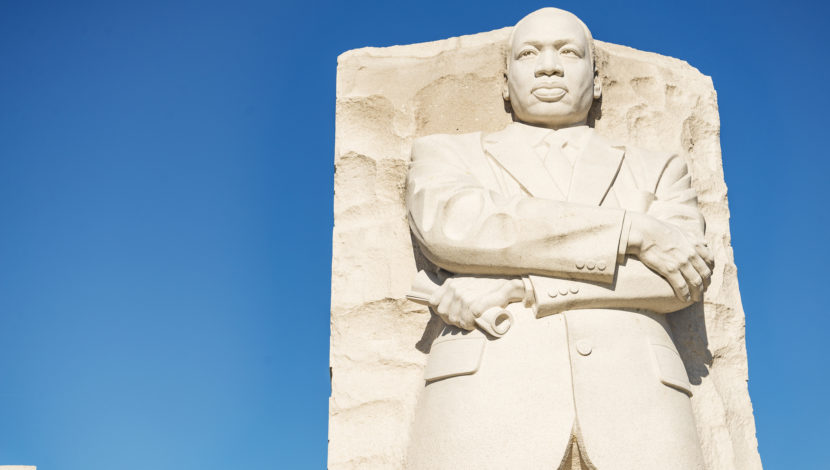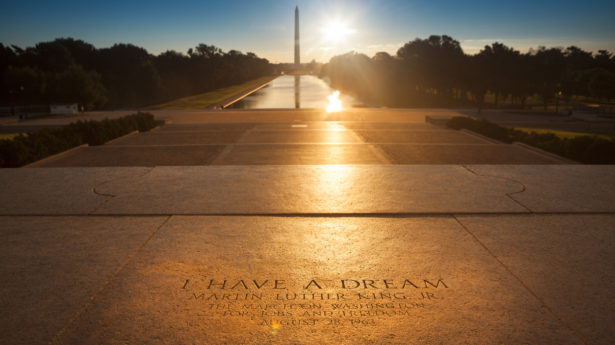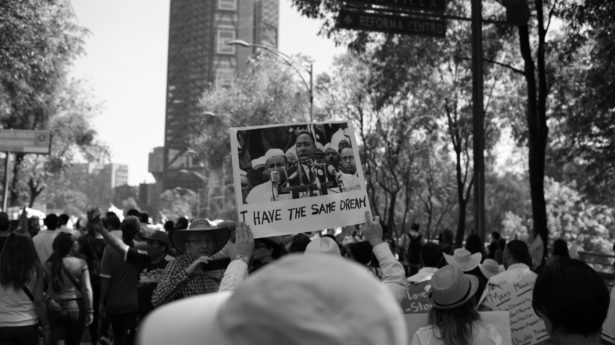The Unitarian Universalist Service Committee advances human rights through grassroots collaborations.
MLK’s Legacy Calls Us Into Radical Action for Justice

By on January 14, 2022
“If you are critical of this most recent chapter of our civil rights history and its leaders who have ushered in the Black Lives movement, I say, well then, you would not have liked Dr. King.”–U.S. Representative Ayanna Pressley, speaking upon receiving UUSC’s Human Rights Leadership Award in 2021
###
It was an honor to be in conversation with Representative Ayanna Pressley at UUSC’s Human Rights Celebration in June 2021 when she accepted our Human Rights Leadership Award. We spoke only five months after she and her colleagues hid for their lives from insurrectionists who stormed the Capitol Building with violent hatred, lies, and (apparently) minimal consequences. She briefly spoke about that day—it was still so fresh.
In addition, Pressley expressed frustration with some of her colleagues who are quick to quote Martin Luther King, Jr.
“But they sanitize him. Yes, he was a pacifist and nonviolent. And he was a radical…Dr. King was the original architect, as far as I’m concerned, of the Black Lives Matter movement…For those who are critical of this most recent chapter of our civil rights history and the leaders who have ushered in the BLM movement, I say, well, then, you would not have liked Dr. King.”
Pressley offers such an important reminder for us—transformative justice, shifting power and privilege, is rarely popular as it is happening. Most of us would claim to be on the “right side” of progressive change that has been won by the hard work (and sacrifices) of radical prophets and activists. But following Pressley’s challenge, we should be asking ourselves how we are supporting the vision of the prophets and activists of today who are calling for change.
At UUSC, we have the privilege of being in relationship with radical changemakers from across the globe. Their practical and visionary work for human dignity, for equity and justice, is shifting power and dismantling systems that oppress. We are often pushed to new understandings, beyond places of comfort, and challenged by views and approaches that remind us that we, too, have work to do, change to make.
We understand that UUSC is part of a global web of systems of oppression. We acknowledge that as a U.S. institution, UUSC holds unearned privilege and has profited from violence and theft inflicted on Black and Indigenous peoples. As our mission calls us to dismantle systems of oppression and advance human rights, we must face our own complicity in oppression and injustice.
This is why equity and justice—racial justice in particular—are guiding principles for us. In all of our partnerships, we strive to follow the leadership of the people who are impacted by systems of oppression and who are creating solutions for themselves and their communities.
In our work for migrant justice, we know we must not only advocate for policies and practices that respect the rights of individuals—we also must expose and challenge the racism that is woven through the laws and the politics that drive this country’s immigration system. We are mandated to serve as the moral counterweight to those who allow their xenophobia, racism, and bigotry to build—and reinforce—systems, institutions, policies, and practices that not only deride people exercising their right to migrate, but criminalize them as well.
One must only look to Haiti to understand how the United States perpetuates racism and hostility. UUSC is answering the call to build a relationship with Haiti and its people to support grassroots solutions as means of rebuilding and repairing the nation.
In our work for climate justice, we aim to counter the silencing of Indigenous leaders—and call attention to the genocide perpetrated against them and theft of homeland and identity affecting their communities—as a way of addressing environmental racism. Racialized extractive capitalism perpetuates theft and displacement of Indigenous people and other people of color.
In our work for disaster justice, striving to create equitable responses to human-made and natural disasters, we partner to not only provide immediate support which is so often unavailable in communities already struggling—particularly communities of color—but also to challenge the forces within government and the non-profit industrial complex that were built (frankly) to perpetuate inequity in times of disaster.
In our own internal practices, financial, human resources, and governance, both our staff and our board are engaged in a rigorous examination of the ways we may be perpetuating the systems our mission calls on us to dismantle. This means confronting the way racism and white supremacy culture have prevented us from living our values “at home,” and building new systems and practices that hold us accountable to those values.
I was a young child when Dr. King was murdered. More and more of us do not have personal memories of his life and work. We can hope that we would have been brave enough to admire and praise and support his radical ministry and activism during his lifetime. But we honor him, as well, with our support and partnership for the radical prophets of today.
Photo Credit: iStock—Photo Italia LLC

